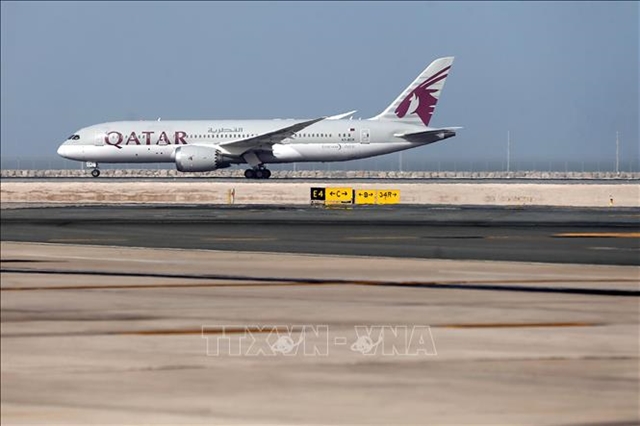 Economy
Economy

Demand from the European Union and North American markets recovered and rose strongly, boosting the export volume of galvanised steel and offsetting weak domestic consumption in the first half of this year, Việt Dragon Securities Corporation (VDSC) said in a report.
.jpeg)
|
| A worker loading Hoa Sen's steel products for export. Photo hoasengroup.vn |
HÀ NỘI — Demand from the European Union and North American markets recovered and rose strongly, boosting the export volume of galvanised steel and offsetting weak domestic consumption in the first half of this year, Việt Dragon Securities Corporation (VDSC) said in a report.
As EU and North American markets account for 80 - 90 per cent of Nam Kim (HKG)’s galvanised steel export and 30 per cent of Hoa Sen (HSG)’s, these leading galvanised steel manufacturing companies all recorded good export volumes in the second quarter, VDSC added.
A monthly report from the Việt Nam Steel Association (VSA) showed that total consumption of galvanised steel was 428,084 tonnes in July, down 6.58 per cent month-on-month but still rose 18.8 per cent compared to the same period last year.
Of which, galvanised steel export volume of VSA members reached 300,404 tonnes, up 6 per cent month-on-month and 84.2 per cent over last year.
Meanwhile, COVID-19 control measures in the south and some big cities have negatively affected domestic demand as local consumption volume fell 35 per cent year-on-year to 127,680 tonnes in July.
During the same period, Hoa Sen sold 158,000 tonnes of galvanised steel, unchanged compared to 155,000 tonnes in June. Of which, export volume rose from 102,000 tonnes in June to 123,000 tonnes in July. Nam Kim’s export volume reached 62,000 tonnes in July, stable from 63,500 tonnes in June.
Việt Dragon Securities believes that galvanised steel exports to EU markets will be stable at a high level until the end of 2022 thanks to favourable trade policies and increasing demand.
The securities firm said that Việt Nam has an advantage over Turkey, South Korea and India thanked to trade policies. South Korea and India, the main competitors of Việt Nam, were imposed quotas of 170,000 tonnes per year and 210,000 tonnes per year, respectively.
Meanwhile, Turkey's galvanised steel has lost its competitive advantage when it was subject to an anti-dumping duty of 4.7-7.3 per cent on hot rolled steel since April. The import quota of galvanised metal (4A) of EU for Việt Nam and other countries is about 2 million tonnes per year in the next three years.
In the first quarter of 2021, the country exported about 300,000 tonnes of galvanised metal, mainly galvanised steel. Therefore, there is still room for growth for Vietnamese galvanised steel manufacturers.
VDSC added that EU steel consumption is forecast to grow 10.2 per cent in 2021 and 4.8 per cent in 2022 on post-pandemic recovery.
On the other hand, lower production costs in Việt Nam can support galvanised steel export revenue in the medium term. During 2021-22, high electricity and carbon prices will make steel production costs in Europe at least US$135 - 155/tonne higher than in Việt Nam.
Currently, the carbon emission price is about $60 per tonne, and one tonne of steel produced from basic oxygen furnace (BOF) will emit 1.85 tonnes of CO2.
Besides, steel produced from electric arc furnace (EAF) accounts for 40 per cent of steel production in Europe and records a production cost that is 15 - 20 per cent higher than that of BOF technology.
In the short term, the hot rolled coil (HRC) price difference between the EU and Việt Nam, which is at a high level of about $300 - 550 per tonne, can turn into 19 - 22 per cent of gross profit margin in the last two quarters of the year.
Domestic galvanised steel exporters may face more challenges in 2023 as a carbon border mechanism in the EU can be applied, resulting in less price competitiveness for Vietnamese products. Therefore, VDSC expects galvanised steel export volumes and profits to drop sharply in 2023.
Meanwhile, as Directive 16 is being applied in the southern provinces, which account for 34 per cent of construction steel consumption, most construction activities were halted, leading to low consumption in July.
Construction steel consumption reached 791,416 tonnes in July, down 7.1 per cent compared to the same period last year, according to VSA’s report.
Steel pipe consumption dropped even more sharply to 143,493 tonnes, down 40.9 per cent.
Prevention measures extended in August caused construction steel and steel pipe consumption to remain low.
Steel stocks attract more attention
On the stock market, the optimistic outlook over galvanised steel exports has been reflected in manufacturers’ value, with NKG and HSG shares witnessing rallies in recent sessions, attracting strong cash flow.
HSG shares closed last week at VNĐ44,900 per cent share, up more than 36 per cent from the bottom set in mid-July, the average liquidity was approximately 20 million shares per session.
NKG shares also jumped nearly 38.2 per cent in market value since the end of July 2021, the liquidity also reached millions of units per session. The company shares traded at VNĐ41,400 per share last Friday. VNS




